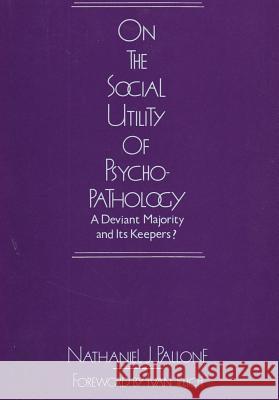On the Social Utility of Psychopathology: Deviant Majority and Its Keepers? » książka
On the Social Utility of Psychopathology: Deviant Majority and Its Keepers?
ISBN-13: 9780887380488 / Angielski / Twarda / 1986 / 92 str.
Nathaniel Pallone argues that, whatever else is true of psycho-pathology, it serves purposes which are socially useful. What-ever else is true of its clinical treatment, such treatment func-tions as a form of social regula-tion. In societal terms, such treat-ment may serve purposes quite other than the relief of psycho-logical disease or even the remedy of psychological disorder. If psychopathology had not emerged naturally, society might have needed to engender psychopathogenic conditions both to fulfill so-cially useful purposes and to elicit that subtle mechanism for social regulation we term -psychother-apy.- Pallone constructs his ar-gument by summing up the evi-dence for two points which apply to all psychotherapeutic practice: that the relief of psychopathology is in no dependable way associ-ated with psychotherapeutic treatment; and that in all schools of psychotherapy, the only clear-cut criterion for terminating treatment is the limit of the pa-tient's financial resources. What surprised me in this manu-script is the stark simplicity with which Pallone constructs his ar-gument that] society acquires the license to create unlimited psy-chological] disease, to define this disease as intolerable, to finance armies of disease alleviators providing 'treatments' that are in even more profound contradic-tion with each other than were the religions of old.... The illustra-tion s] make Pallone's argument crystal clear. --Ivan Illich, from the Preface











